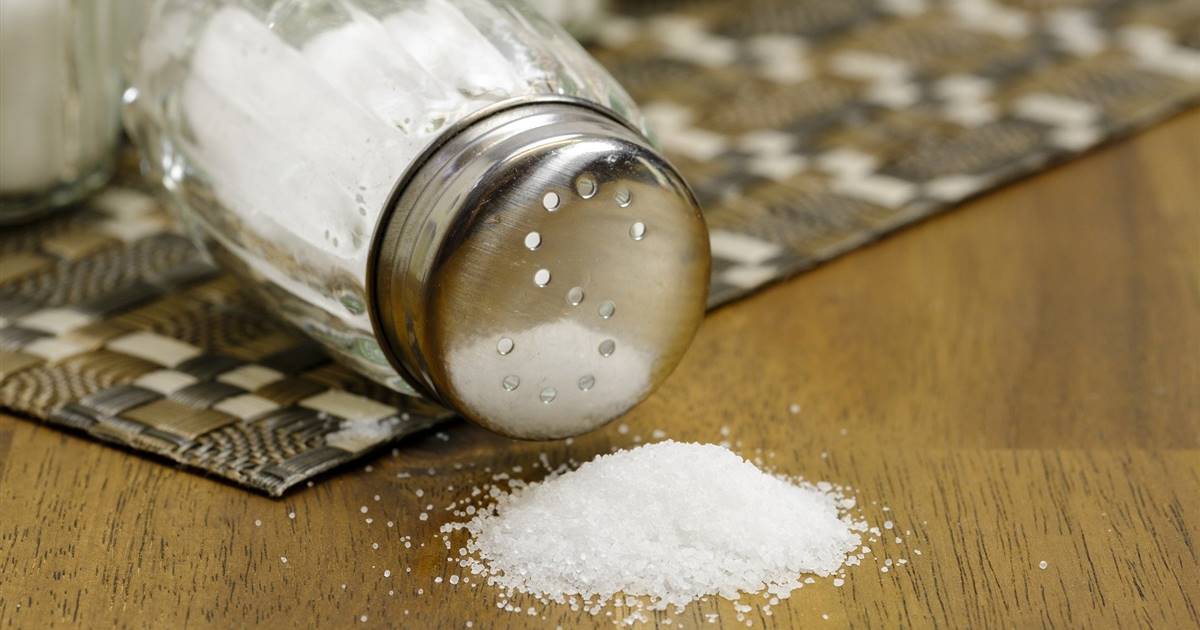
In order for the body to function and stay healthy, it needs a certain amount of salt. Sodium chloride regulates body water balance and tissue tension and is essential for the excitability of muscles and nerves. It also participates in digestion and bone structure. But excess becomes a cause for trouble.
The World Health Organization (WHO) recommends this do not consume more than 5 g of salt per day. But many of us eat much more than we need to. The salt we add to cooking and dressing is an important part of the intake, but we also take other amounts that go unnoticed through ultra-processed foods.
The foods with the highest salt are aged cheeses, pickles and other preserves, ready meals and delicacies. At the end of the day, on average, we Spaniards consume an average of 10 g of salt, double the recommended amount.
We’re taking too much salt
If the body receives too much salt, the excess is excreted by the kidneys. The body also loses water in this process, which makes us thirsty. In the long run, if the excess salt remains, the kidneys become overworked.
If you do not drink enough, excess sodium causes a constriction of blood vessels that increases blood pressure. Therefore, one of the tips given to hypertensive people is to reduce salt intake.
If the salt intake is excessive, may be toxic. Sodium extracts water from cells, which is physiological stress. If the water balance is not restored, diarrhea and vomiting occur. In severe cases, lack of water can lead to heart and respiratory disorders or even death.
10 physical signs that you are taking too much salt
1. However, the constant
If you have eaten salty foods, your body will require water more often. It is essential to respond to this need because the body needs it for the balance of minerals outside and inside the cells. Excessive thirst can also be a sign of type 1 diabetes.
2. Swelling of the face
When you wake up in the morning, you may notice that the area around the eyes and cheeks is inflamed. A higher salt intake the day before may be the reason for this. Excess salt causes the fluid is retained between the cells and the tissues literally swell.
3. The scale shows more weight
Excess calories do not always make you fat. Salt retains fluid and weighs, but don’t panic, a day with a little salt and a lot of water (Yes, although it seems parodic, because it is just about diluting sodium) will help eliminate excessive water retention.
4. The food tastes bland.
Eating processed and prepared foods too often can blur our perception of salty taste. People who suffer from this often say that they find vegetables very tasteless. It is important to consciously reduce the amount of salt added. Because the taste buds on the tongue are renewed regularly, they can become accustomed to foods low in salt.
5. Constant headaches
Headaches can be caused by excessive salt intake. The typical signs are punctures and pressure in the temple area, as salt causes the blood vessels in the brain to dilate. If you have this type of headache, it is important to drink plenty of water.
6. Kidney stones
If the concentration of salt in the urine increases and the kidneys are not washed with enough water, crystals may form. The salts are deposited on top of each other in layers, so that the kidney stones develop over time. Stones can be very painful.
It is important to drink 1.5 to 2 liters a day, especially if you exercise a lot or it is hot. This cleanses the kidneys and prevents the accumulation of waste. If small kidney stones have already formed, it also helps to drink a lot and move to excrete them.
7. High blood pressure
An optimal blood pressure is 120/80. However, too much salt can lead to high blood pressure in the long run because the vessels contract and harden, which means that the heart must pump faster and with more pressure.
If you already have high blood pressure, you should carefully monitor your salt intake and have regular check-ups.
8. You get sick more often
In one experiment, the researchers divided the mice into two groups and fed them low-salt foods and high-salt foods for a week. The mice were then infected with the bacteria Listeria and E. Coli, which are found in our food. Mice that were fed a low-salt diet he had several immune cells than mice fed a high-salt diet. In the group fed a high-salt diet, the infections also lasted much longer.
9. Sleep disorders
Eating too salty foods can lead to sleep disturbances, such as restless sleep, frequent waking up and restlessness in the morning on waking. The most restless sleep occurs when consuming a lot of salt at night high sodium content leads to high blood pressure and fluid retention.
10. Water and electrolyte disorders
Hypernatremia means you have too much salt in your blood. This upsets the balance of fluid and electrolytes in the body. A doctor can determine this with a blood count. If there is a strong excess of salt, edema may occur, is the accumulation of water in certain places of body tissue. In severe cases, it can even lead to unconsciousness or an epileptic seizure.

